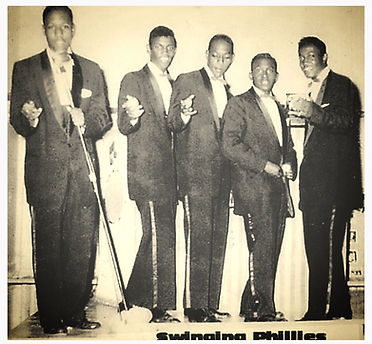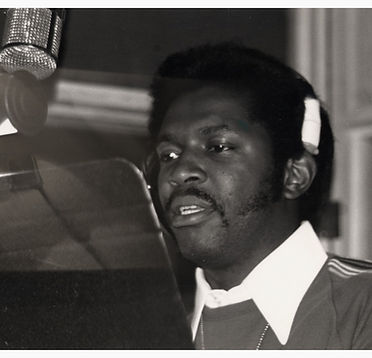





Five decades of music...
While his name appears on an absolute ton of albums worldwide, unless you are a DJ or an avid label and liner note reader, you’ve probably never heard of him.
Phil Hurtt is the man who penned the Spinners number one, multi-million seller "I’ll Be Around", the classic O’Jays r&b song "Sunshine", as well as hits for disco mavens the Ritchie Family and Sister Sledge. His BMI catalog reflects the career of this prolific songwriter.
In 1977, Billboard magazine nominated Hurtt as Disco Composer of the Year, with five songs in nomination. And two of his albums were nominated as Best Disco Album of the Year – African Queens by the Ritchie Family and The Village People, which contained the now classic San Francisco and Hollywood. All of the tunes on both albums were written and vocally arranged by Phil Hurtt.
Other artists who have recorded Phil’s material or have been produced by him include: Nas, Jay-Z, Christina Millian, Jeffrey Osborne and the Rippingtons, Eva, Little Anthony and the Imperials, the Persuaders, LL Cool J, Jean Carn, the Impressions, Jackie Moore, Stanley Turrentine, the Chi-Lites, Garland Green, Fareed Haque, the Checkmates, the Duke Ellington Orchestra under the direction of Mercer Ellington, LTD, Joe Simon, Vivian Reed, Rappin’ 4-Tay, the Impressions and more than one hundred different artists in all.
Earlier in this career, Phil also provided background vocals for many artists including the Salsoul Orchestra, Eddie Kendricks and Blue Magic. Born in Wilmington, Delaware, just one-half hour south of Philadelphia, Pennsylvania, Phil’s family made the move to the big city when he was just a small boy. He remembers growing up during the time when there was a singing group on every corner. “I can recall singing with three or four groups at one time,” he recalls. “It was a matter of survival...if you could sing, you were cool.”
At the tender age of 12, Phil was recruited by his older brother Al (a gifted writer himself) for his own group, which also featured their cousin, Sarah Williams, and a church friend, Sam Hill. The group, Sarah and the Dreams, traveled to New York and appeared regularly at clubs in and around Harlem. “I was tall for my age and could pass for 18. To say the least, Harlem, even just on weekends, was and experience. I met Sam Cooke, the Chantelles, Little Willie John, the Cadillacs, Frankie Lymon, the Coasters, and the Five Satins, just to name a few.” Later, after Sarah married, Al formed another group, the Singing Phillys. It was scouted and signed to a recording contract with King Records. Phil was 15 when their first record Frankenstein’s Party, written by Al, was released. It was about this time that Phil’s lyric writing talent first surfaced.
After serving in the armed forces, Phil returned home to Philadelphia, where he quickly realized that, musically, Philly was beginning to “really happen.” A high school buddy, Thom Bell (with whom he later co-wrote of I’ll Be Around) was working for Cameo Records. Later, Bell later became an industry giant. “Tommy was always giving someone nicknames and he gave me that ‘P-H Factor’ for Phil Hurtt.” Around this same time, Phil met Leon Huff, Leroy Lovett and Kenny Gamble.
“I remember Huff played piano and worked a lot of sessions. I believe he was under contract to Mercury Records. When Mercury closed its Philly office, he approached me. He said he liked my lyrics and wondered if we could work together. By that time, Huff had written a couple of hits, so I was in awe! I guess I lacked confidence, because I never called him. Three months later he began working with Kenny Gamble. The rest is history.”
In the years that followed, Phil became involved with Gamble and Huff. Although not under contract to them, he had at least 40 of his tunes recorded by their artists, including the O’Jays, Billy Paul, Bunny Sigler, O.C. Smith, and the Chambers Bros., among others. 1972 saw Phil’s talents tapped by the late LeBaron Taylor, then a disk jockey, station manager and record producer. LeBaron was leaving WDAS for a position at Atlantic Records, and he hired Phil as a writer/producer. “LeBaron gave me the confidence and the studio expertise that I needed…plus I found a real friend.”
While at Atlantic, Phil wrote and produced many hits, among them, "Sweet Charlie Babe" by Jackie Moore; "Some Guys Have All the Luck” by the Persuaders, and Clyde Brown’s "You Called Me Back". Vivian Reed, Diane Steinberg, Willis Jackson, Bettye Swan and Percy Sledge also recorded Phil’s tunes. Not surprisingly, Phil turned out to be quite a scout as well. One evening he walked into a Philly club called “Scabadoo” and was impressed by four singing sisters. He promptly called LeBaron Taylor, and they signed Sister Sledge. Phil’s skills were also called upon to create a sound for another new group that was in the works: the Village People.
After 5 gold albums and two gold singles with other artists, friends like long time friend Richie Rome (whom Phil referred to as “Magic”) finally convinced Phil to sign his own recording contract with Fantasy Records in 1977. For his debut album, entitled Giving It Back, Phil and Richie wrote nine remarkable songs, each handled with his special sensitivity. Phil produced the album, with the arrangements done by Rome. Phil’s second album PH Factor, released in 1979, was a departure from the sensitive side of Phil Hurtt concentrating on the “boogie.” It was an album that reflected the attitude of the time: life, love and enjoying them as much as possible.
1979 was also the year that found Phil, once again, working with the Village People. Jacque Morali and Henri Belelo, the masterminds behind the 70’s phenomenon, asked Phil and Peter Whitehead to write songs for an upcoming movie. It was to star the Village People, and would fictionalize the beginnings of the popular group, hopefully capitalizing on their success. The film, Can’t Stop The Music, was released in 1980. It featured several of Phil’s songs, and although not a commercial success, the film became and underground cult classic, particularly on the continent of Europe.
Since the early-80’s, Phil has found the inspiration for his work from a higher source. His short-lived label, Gospel Gems Records was home to the remarkable Betty McCullough and the Voices of Praise, and later Ava Williams and Light. Determined to spread the gospel using his God-given talent, Phil founded Sweet Spirit Records in 1998 and signed the amazing J. Teddy Johnson.
The recent increase of interest in “pure” r&b and dance has revived the old catalog for Phil Hurtt. Newer artists have approached him on a regular basis for the permission to record his well-known classics as well as more obscure tracks that Phil himself had all but forgotten about. “It amazes me when I receive a letter from someone like LL Cool J or Fareed Haque asking if ‘it’s alright’,” he laughs. “As if I’m going to say ‘no, I’m sorry I don't want anyone to record my material’…it’s crazy!”
